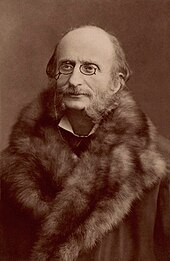Madame l'archiduc

Madame l’archiduc (French pronunciation: [madam laʁʃidyk]) is an opéra bouffe, or operetta in three acts, by Jacques Offenbach, with a French libretto by Albert Millaud first performed at the Bouffes-Parisiens (Salle Choiseul) in Paris in 1874.[1]
After a slow start Madame l’Archiduc had an opening run of 100 performances.[2] It was seen in Vienna in 1875 and London in 1876.[3] Highlights of the score include the quartet in cod-English for the count, countess and young couple in Act 1, an ‘alphabet’ sextet for Marietta, Giletti and the conspirators in Act 2, and a polka for the arrival of the dragoons.[4]
Roles
[edit]| Role | Voice type | Premiere Cast, 31 October 1874 |
|---|---|---|
| Marietta | mezzo-soprano | Anna Judic |
| Fortunato, captain of the archduke’s dragoons | soprano | Laurence Grivot |
| La Comtesse | soprano | Perret |
| Giacometta | soprano | Godin |
| The Archduke Ernest | tenor | Daubray |
| Giletti | tenor | Habay |
| Le Comte | baritone | Lucien Fugère |
| Innkeeper | tenor | Homerville |
| Riccardo | baritone | Desmonts |
| Beppino | Maxnère | |
| Scoevola, a conspirator | tenor | Pierre Grivot |
| Coclès, a conspirator | baritone | Scipion |
| Thémistocle, a conspirator | tenor | Jean-Paul |
| Lycurgue, a conspirator | bass | Guyot |
| Piano-dolce, a minister | tenor | Courcelles |
| Andantino, a minister | tenor | Durand |
| Tutti-frutti, a minister | bass | Maxnère |
| Chi-lo-sa, a minister | bass | Rivet |
| Chorus: waiters, waitresses, dragoons, servants, ladies and gentlemen of the court | ||
Synopsis
[edit]- Time: around 1820
- Place: the duchy of Parma
Act 1
[edit]Scene : an inn
Four conspirators meet to discuss the plot to do away with the archduke Ernest. Giletti and Marietta, servants at an inn are getting married. The count of Castelardo, who is in a conspiracy against the archduke, arrives at the inn with his young wife, trying to disguise themselves. When the hostelry is surrounded by the archduke’s dragoons, led by the short captain Fortunato, Giletti and Marietta are persuaded by the count to accept 10,000 ecus to pass themselves off as the count and countess of Castelardo. Arrested by Fortunato, the young couple are sent off to the Castelardo palace.
Act 2
[edit]Scene : the palace of Castelardo
Giletti and Marietta meet the conspirators, who explain to Giletti that he must assassinate the archduke, but try to escape at his arrival. The archduke Ernest, who introduces himself as the most original of all archdukes, after condemning the plotters to death, is overwhelmed by the beauty of Marietta. He abdicates in her favour, but she then makes the conspirators her ministers – thus allowing his ministers in turn to become plotters.
Act 3
[edit]Scene :
Fortunato must carry out the orders of the new ruler, who wishes to prevent Ernest from getting into her room incognito that night. The archduke is caught and only saves his skin by revealing his identify to Fortunato, who allows him to escape, only to then turns his attentions on the supposed countess. Giletti appears, being sent on his way to be ambassador to Naples, with a sealed letter setting out his credentials, which states "hold on to this idiot as long as possible". The archduke, who has now decided to conspire against Marietta, has met at the inn another beautiful girl – who turns out to be the real countess. He retakes his crown, gives 10,000 ecus to Giletti and Marietta (who use it to buy up the inn), and dispatches the count to Naples with the same, re-sealed, letter.
References
[edit]- ^ Lamb A. Jacques Offenbach (work list). In: The New Grove Dictionary of Opera. Macmillan, London and New York, 1997.
- ^ Noel E & Stoullig E. Les Annales du Théâtre et de la Musique, 1er édition, 1875. G Charpentier et Cie, Paris, 1876.
- ^ Traubner R. Operetta, a theatrical history. Oxford University Press, Oxford, 1983.
- ^ Harding J. Jacques Offenbach. John Calder, London, 1980.
